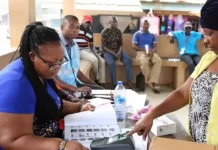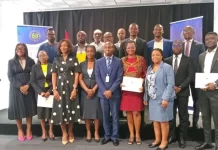
About 1,000 farmers in northern Nigeria will be trained on good agricultural practices and entrepreneurial skills thanks to a new partnership between Nestlé Nigeria and the International Fertilizer Development Center (IFDC).
Nestlé Nigeria and IFDC have launched a two-year pilot project that aims to help smallholder farmers, of whom 40% are women, in the Sahel and Sudan Savanna areas of the country to develop farming as a business and improve the quality and yields of millet and sorghum, which are popular staple crop ingredients in West African meals.
Each year, Nestlé sources about 7,000 tonnes of sorghum from farmers in northern Nigeria which it uses, for example, as a substitute malt ingredient to tailor its products such as Milo to match the preferred tastes of the local population. It also uses millet sourced from Nigerian farmers in its family cereals like Golden Morn.
Together with IFDC, Nestlé Nigeria looks to further strengthen its work with farmers to provide them with training on good agricultural and storage practices. The training, which will be delivered by using simple, farmer-friendly materials, will teach farmers to manage farming as a business. It will also emphasise crop quality and safety, and in turn, improve their livelihoods.
The pilot project, partly funded by Context Global Development, will run until 2018 with an aim to be scaled up and extended for an additional five years.
“Our new collaboration with IFDC, together with farmer groups and supplier partners, looks to support farmers in northern Nigeria by providing them with the tools and capabilities to produce high-quality, disease-resistant crops for future food security,” said Dharnesh Gordhon, Managing Director for Nestlé Nigeria.
“Improving the quality of sourced millet and sorghum will not only provide safer ingredients for local communities and consumers, it will also empower farmers to develop a sustainable farming business and boost their financial status and independence.”
“We are looking forward to our new collaboration with Nestlé Nigeria,” said Dr Arno Maatman, 2SCALE Chief of Party for the IFDC. “The company is a fitting private partner because of its strength, professionalism and high standards that it instils to produce quality products for local consumers, and also because of the close and fair relations it wants to build and maintain with smallholder farmers. Through this partnership, we seek to achieve better and more sustainable incomes for the smallholder farmers involved.”
The new pilot builds on the Nestlé Grains Quality Improvement Project (GQIP), which was launched in 2008 in Nigeria, in collaboration with the Federal Ministry of Agriculture & Rural Development and the International Institute of Tropical Agriculture (IITA). The programme has also been implemented in Ghana.
The GQIP aims to improve the quality and safety of grains and the health of rural communities by cutting the high levels of fungal-based mycotoxins, which can cause serious health problems. In addition, it seeks to reduce the impact of global food shortages on cereal grain quality and reduce the dependence on imported raw materials.
As part of the GQIP, Nestlé Nigeria will also train an additional 15,000 farmers in Nigeria, of whom about two fifths are women, to also cultivate high-quality sorghum, soya beans and maize crops. Nestlé will continue to use its ‘train the trainer’ approach and train its suppliers, who in turn, will teach farmers.
Nestlé’s work with farmers in Nigeria is part of the company’s way of doing business, which it calls ‘Creating Shared Value’. It aims to provide opportunities and improve livelihoods for the communities in which it operates, while developing its own activities.
























